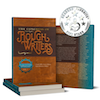A Recipe for Writing a Novel 99 Words at a Time

No matter the writing season, it can be difficult to find ways to keep your writing fresh and moving forward. Today, writer Charli Mills shares a recipe to help writers create big projects in small, bite-sized pieces:
One old mountain man asked another, “How do you eat an entire grizzly?”
The second man replies: “One bite at a time, Pard!”
Growing up in the shadow of silver mines on the eastern slope of the Sierras, I had plenty of time as a kid to poke around history and contemplate a dream to write historical fiction. Voices of mountain men like Kit Carson filled my imagination. Names on tilting marble tombstones emerged as characters.
Fast forward many decades later and I’m still poking a pen at times past. Novels, especially ones brewed in the filters of history, take a considerable time commitment. I’ve learned what the mountain man adage means—place one scene down after another, one chapter after another, one draft revision after another.
Constraints (word count or time) can form patterns that imprint the brain. When writers repeat the challenge regularly, flash fiction trains brains to resolve the 99-word problem. It’s like magic, but it’s science. So, when drafting a novel, you can write scenes, dialog, character profiles or setting in 99-word increments.
Like eating a grizzly one bite at a time, 99 words makes 50,000 feel doable.
In 2014 I launched Carrot Ranch Literary Community to connect with other writers and to make literary art accessible. My mission aligns with that of NaNoWriMo. I witness the transformational power of creativity every week when I compile the collection of 99-word flash fictions from writers around the world. I see it played out every November and subsequent NaNoWriMo.
As you prepare to take on the grizzly bear that is writing a novel, take some tips from writing small bites. I’ve arranged a few recipes:
For the busy writer, serve quickly. Write 99 words in five minutes.For the pantser, write a story until it feels complete. Likely the results will be hundreds of words. Distill the main idea into 99 words. Or use a section and make sure it stands on its own as a 99-word story.
For the plotter, map out three acts. Whip up a beginning, middle, and end. Serve.
For the distracted author, write your WIP in 99 words. Take a scene or character and apply the prompt and constraint. The constraint will give you focus.
For the undecided author, write one 99-word flash in different voices, styles or perspectives to discover what resonates with you. It’s a brief commitment and can help you decide.
For the lonely blogger, bring a dish and join the potluck. Write 99 words and visit the flash fiction posts of others, striking up delicious conversation. Everyone is welcome at CarrotRanch.com.
My novels are now in revision; the way miners refine ore. Flash fiction can also be a powerful editing tool, filling gaps, focusing scenes, and using brevity to tighten writing. Remember, every novel begins with the first 99 words.

From riding horses to writing stories, Charli Mills is a born buckaroo wrangling words. She writes stories set in the American West, giving voice to history, women, rocks, and veterans. She founded an imaginary place called Carrot Ranch where real literary artists from around the world gather. As lead buckaroo, she’s crafted and compiled thousands of 99-word flash fictions. Charli created The Congress of the Rough Writers Flash Fiction Anthology series with her literary community.
Top image licensed under Creative Commons from mazaletel on Flickr.
Chris Baty's Blog
- Chris Baty's profile
- 62 followers



